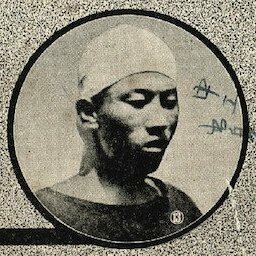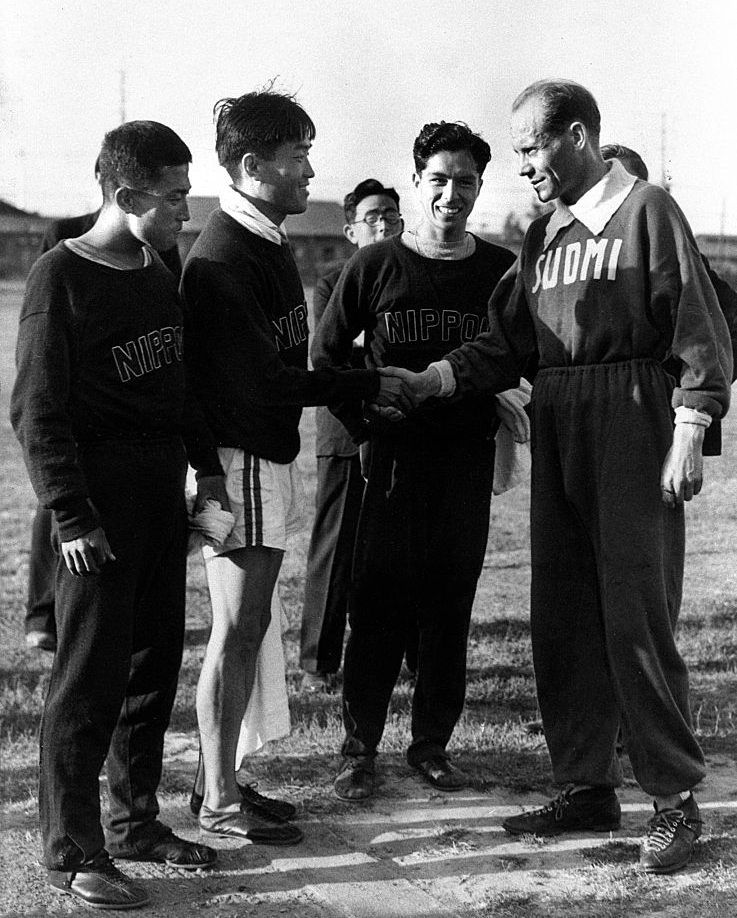1. Overview
Kim Un-bae (김은배Kim Un-baeKorean; 金恩培Kin OnbaiJapanese) was a prominent Korean marathon runner and a significant figure in Korean sports history. Born in Gyeongseong (present-day Seoul) during the Japanese colonial rule, he gained national recognition for his athletic achievements while representing Japan at the 1932 Summer Olympics in Los Angeles. His participation in the Olympics, where he finished sixth in the marathon, became a symbol of Korean national identity and resistance, particularly through the "Japanese flag deletion incident" involving the Dong-A Ilbo newspaper. Following Korea's liberation from Japanese rule, Kim Un-bae dedicated his efforts to the development of sports in South Korea, serving in various administrative and coaching roles. There is a discrepancy regarding his birth year, with some sources indicating 1907 and others 1913, while his obituary suggests a birth year around 1910 or 1911.
2. Life and Background
Kim Un-bae was born into a wealthy family in Gyeongseong, which is now Seoul, the capital of South Korea. His early life was shaped by the period of Japanese colonial rule over Korea, which influenced his athletic career and later his contributions to the newly independent nation.
2.1. Childhood and Education
In 1928, Kim Un-bae enrolled in Yangjeong Higher Common School in Gyeongseong, an institution equivalent to a middle school under the Japanese educational system. It was here that he began to develop his skills as a long-distance runner, quickly distinguishing himself within the school's track and field club. By his third year, he had become a key athlete, playing a crucial role in the school's rise to prominence as a renowned institution for track and field. His success was also attributed to the dedicated coaching of Shōtarō Minegishi, a Japanese teacher who significantly contributed to the development of the Yangjeong track and field program. After graduating from Yangjeong Higher Common School, Kim Un-bae continued his education at Waseda University in Japan, where he pursued studies in the School of Political Science and Economics.
3. Athletic Career
Kim Un-bae's athletic career was marked by significant achievements in long-distance running, particularly in marathons and ekiden races, which brought him national attention even under colonial rule.
3.1. Early Activities and Achievements
Kim Un-bae emerged as a prominent runner in the early 1930s. In October 1931, he participated in the 7th Joseon Meiji Shrine Tournament marathon, where he achieved a remarkable time of 2 hours, 26 minutes, and 12 seconds. Although this time was significantly faster than the then-current world record, the course was not officially recognized, and thus his achievement was not formally recorded. Furthermore, as it was his first marathon, some doubts were raised about the validity of the record. However, his performance continued to impress. In November of the same year, he competed in the Meiji Shrine Sports Festival marathon, a precursor to the modern National Sports Festival in Japan. In this race, held on a certified course, he finished second with a time of 2 hours, 34 minutes, and 58 seconds, breaking the existing Japanese national record and solidifying his reputation as a formidable marathon runner, finishing only behind Tamao Shiohachi. Also in November 1931, Kim Un-bae won the Gyeong-yeong Marathon, which was run on a shortened course between Gyeongseong and Yeongdeungpo. It was during this period that Sohn Kee-chung, who would later become a gold medalist in the 1936 Berlin Olympics marathon, first learned about the sport of marathon running after hearing about Kim's victory. The following year, Sohn Kee-chung enrolled at Yangjeong Higher Common School and became Kim Un-bae's teammate.
3.2. 1932 Los Angeles Olympics
Kim Un-bae's most notable athletic achievement came at the 1932 Summer Olympics in Los Angeles. In May 1932, he competed in the final Olympic marathon qualifying race, where he secured second place, finishing behind fellow Korean runner Kwon Tae-ha. This performance earned him a spot on the Japanese Olympic team. As Korea was under Japanese colonial rule at the time, Kim Un-bae, along with Kwon Tae-ha and boxer Hwang Eul-soo, became one of the first ethnic Korean athletes to participate in the Olympic Games, representing Japan under his Japanese name, Kin Onbai. In the Olympic marathon held in August, Kim Un-bae delivered a strong performance, completing the race in 2 hours, 37 minutes, and 28 seconds, which earned him a respectable sixth-place finish. His participation, despite the circumstances of colonial representation, was a significant moment for Koreans, symbolizing their athletic prowess on the international stage.


3.3. Hakone Ekiden
During his time as a student at Waseda University, Kim Un-bae continued to compete in long-distance running events, notably participating in the prestigious Hakone Ekiden relay race. He ran in the Hakone Ekiden in both 1934 and 1935. In the 1934 race, he distinguished himself by running the 7th section, where he not only won the section award for the fastest time but also played a crucial role in contributing to Waseda University's overall victory in the competition.
4. Post-Liberation Activities
Following Korea's liberation from Japanese rule in 1945, Kim Un-bae remained in South Korea and dedicated his efforts to rebuilding and developing the nation's sports infrastructure. He was instrumental in promoting marathon running and served in various leadership capacities within the Korean sports community. Alongside Kwon Tae-ha, Sohn Kee-chung, and Nam Sung-yong, he co-founded the "Marathon Promotion Association," an organization aimed at popularizing and supporting marathon running in the newly independent country. Kim Un-bae subsequently held several important positions in the field of athletics, including serving as the director of the Korea Amateur Athletic Federation. His commitment to fostering athletic talent extended to coaching, as he took on the role of coach for the Korean track and field team at the 1952 Summer Olympics held in Helsinki, Finland. Throughout his post-liberation career, he continued to be a guiding figure, nurturing future generations of athletes and contributing significantly to the growth of track and field in South Korea.
5. Death
Kim Un-bae passed away on March 6, 1980. His obituary, published in the Dong-A Ilbo newspaper on March 7, 1980, stated that he was 70 years old at the time of his death. This would place his birth year around 1910 or 1911, which differs from the 1913 birth year often cited in sports records and the 1907 birth year found in some Korean encyclopedic entries.
6. Evaluation and Impact
Kim Un-bae's life and career hold significant historical and societal importance within Korean sports and national identity, particularly due to the complex circumstances of his athletic prime under colonial rule and his subsequent contributions to an independent Korea.
6.1. Connection to the Japanese Flag Deletion Incident
Kim Un-bae's sixth-place finish in the 1932 Los Angeles Olympic marathon became intertwined with a pivotal moment in Korean resistance history: the "Japanese flag deletion incident." When the Dong-A Ilbo newspaper reported his Olympic achievement, it symbolically edited out the Japanese flag from the photograph of the results, replacing it with a blank space. This act of defiance was a powerful expression of Korean national sentiment against Japanese colonial rule and a silent protest against the forced representation of Korean athletes under the Japanese flag. The incident, which was the first known instance of such censorship against the Japanese flag in colonial media, resonated deeply with the Korean public, highlighting the complex and often painful identity of Korean athletes during that era. It underscored the desire for national sovereignty and the longing for a future where Korean athletes could compete under their own flag. The incident remains a significant historical event, reflecting the spirit of resistance and the assertion of national identity during a period of oppression.
6.2. Impact on the Sports World
Kim Un-bae's influence on Korean track and field and the broader sports community was profound and long-lasting. As an athlete, his remarkable performances, particularly his strong showing at the 1932 Olympics, inspired many young Koreans, including future marathon legends like Sohn Kee-chung. After Korea's liberation, he transitioned from a celebrated athlete to a dedicated administrator and coach, playing a crucial role in the foundational development of modern South Korean sports. His efforts in organizing the "Marathon Promotion Association" and serving in key positions within the Korea Amateur Athletic Federation helped establish the organizational framework necessary for the growth of track and field. By coaching the national team at the 1952 Helsinki Olympics, he continued to directly contribute to the nurturing of new talent and the improvement of Korean athletic standards on the international stage. His legacy is not only defined by his personal achievements but also by his unwavering commitment to fostering a vibrant sports culture in post-war Korea, making him a revered figure in the nation's athletic history.